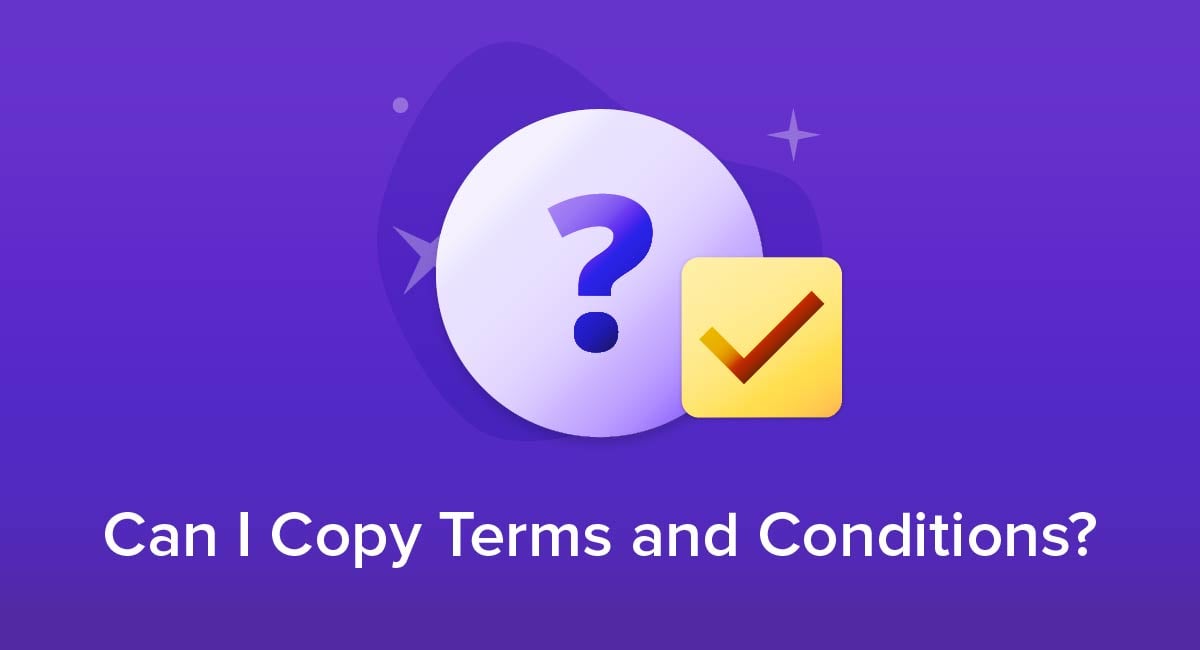
Given that nearly all businesses use Terms and Conditions agreements, it may seem like an obvious time-saving exercise to copy existing Terms and Conditions from another business and use it for your own business. However, this is a bad idea in practice.
This article will explain why you shouldn't copy Terms and Conditions agreements. We also offer some better alternatives to help you create your own agreement.
Our Free Terms and Conditions Generator is created to help you generate a professionally drafted agreement that can include various terms and conditions for your site and/or app.
- Start the Free Terms and Conditions Generator from our website.
- Select platforms where your Terms and Conditions will be used (website, app or both):
- Answer a few questions about your website or app information:
- Select the country:
- Answer a few questions about your business practices:
-
Enter your email address where you'd like to receive the new Free Terms and Conditions and click "Generate":
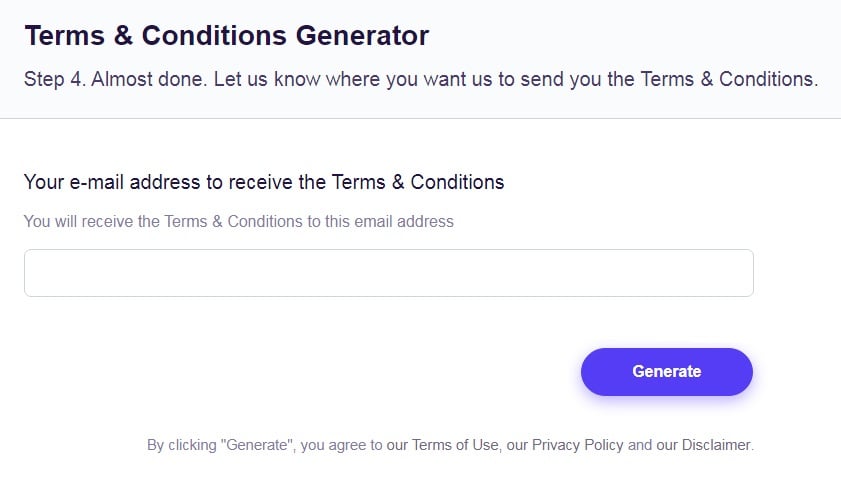
Once generated, you can copy and paste your Free Terms and Conditions agreement on your website or app or link to your hosted Free Terms and Conditions page.
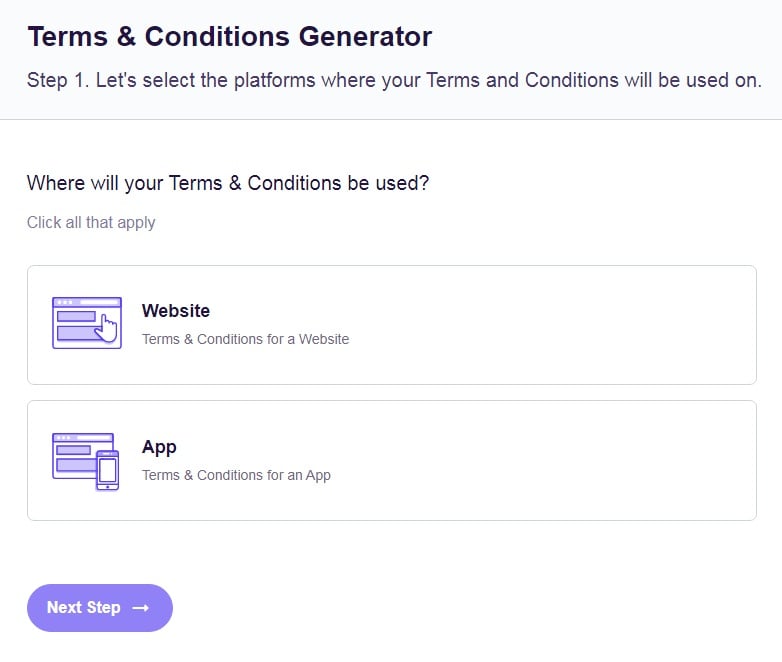
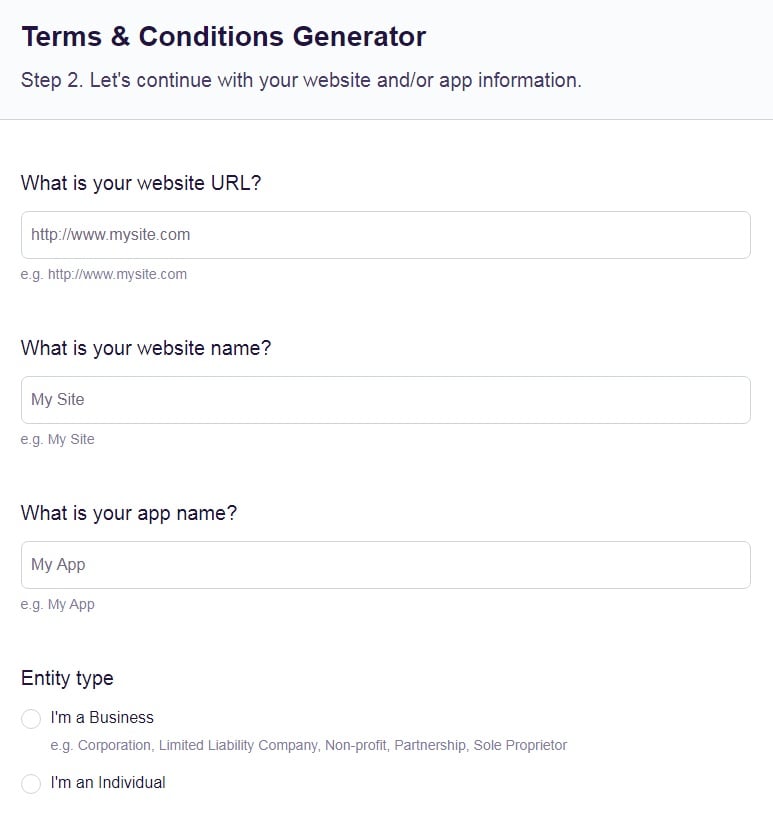
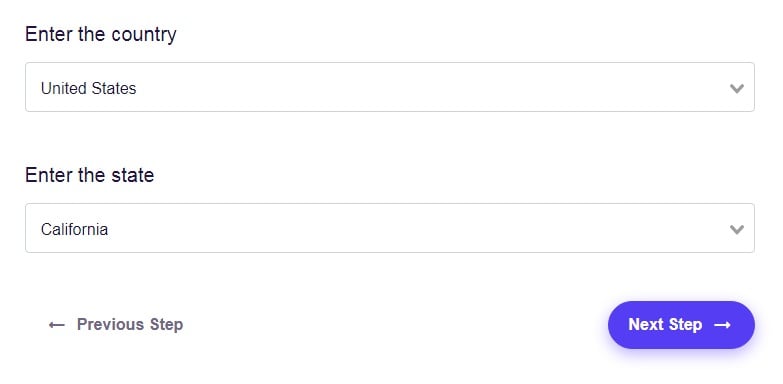
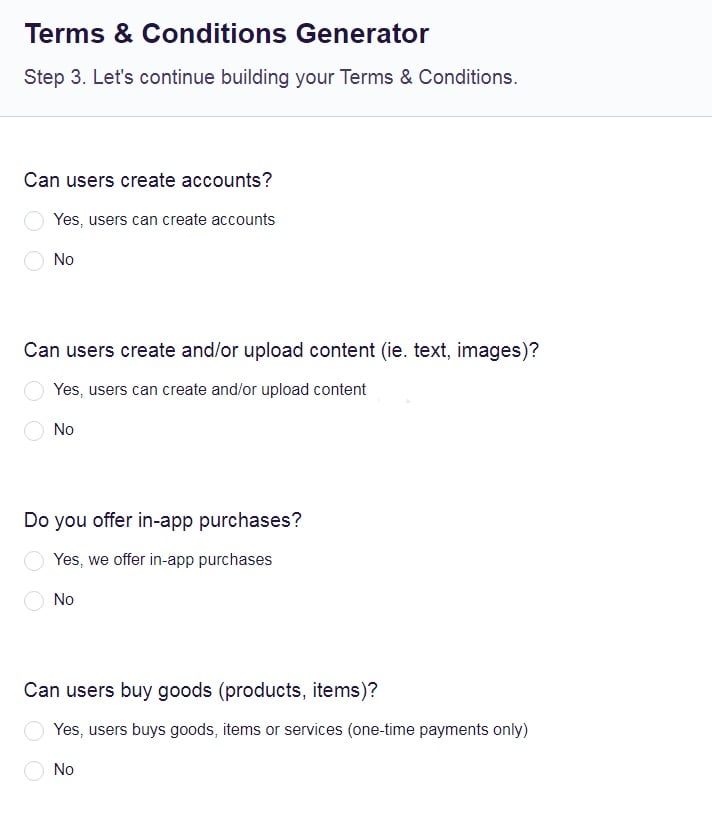
- 1. Why You Shouldn't Copy Terms and Conditions Agreements
- 1.1. Copyright Issues With Terms and Conditions Agreements
- 1.2. Inaccuracies When Copying Terms and Conditions Agreements
- 2. How to Write Your Own Terms and Conditions Agreement
- 2.1. Use a Terms and Conditions Generator
- 2.2. Use a Terms and Conditions Template
- 2.3. Use Another Terms and Conditions Agreement For Inspiration
- 2.3.1. Content of the Terms and Conditions Agreement
- 2.3.2. Format of the Terms and Conditions Agreement
- 2.3.3. Presentation of the Terms and Conditions Agreement
- 3. Summary
Why You Shouldn't Copy Terms and Conditions Agreements
There are two main reasons why you shouldn't copy another's Terms and Conditions. First you can run into copyright issues. Secondly, your copied agreement likely won't accurately reflect your actual business practices.
Copyright Issues With Terms and Conditions Agreements

Copying somebody else's Terms and Conditions agreement is potentially a violation of that person's (or business's) copyright.
This might seem unintuitive as many of us associate copyright with works of art such as books or movies. However, copyright can apply to most written content because it actually covers any expression of ideas in a permanent format. In most jurisdictions, copyright automatically exists as soon as somebody writes the text down.
Copyright covers creativity of expression rather than facts. You can't hold the copyright on the actual terms or individual conditions, for example the fact you require payment within seven days or the fact you give one warning before banning a site user. However, you do hold the copyright on the specific wording you use to express these facts.
As a rule of thumb, the more identical wording across the two documents, the more likely a court is to rule that you've violated copyright rather than it simply being a coincidence and there only being a limited number of ways to say the same thing. If you've simply copied Terms and Conditions, it will be clear you have violated copyright.
For example, Pandora and Dyson both cover the same policy on sales taxes in their Terms and Conditions agreements, but they each use slightly different wording. Using the same phrasing could raise concerns over copyright, while either copying a paragraph in full would be a clear violation.
Here's Pandora's clause:

And here's Dyson's:

In reality, it's unlikely you would face the most severe legal consequences for copying somebody's Terms and Conditions. However, violating copyright by doing this is still a bad idea.
Even if you don't face the most serious consequences, you could still have to spend time and money dealing with complaints or allegations of a violation. You could also suffer damage to your reputation within your industry and with customers.
Inaccuracies When Copying Terms and Conditions Agreements

Another reason not to copy Terms and Conditions is that the details may be inaccurate for your situation. This could lead to confusion, ambiguity and unwanted consequences.
One such danger is that you include irrelevant clauses in your Terms and Conditions. This could happen if you copy from a business that operates in a different industry to you, or one that works in a different way. For example, you might copy Terms and Conditions that refer to special types of law (such as maritime law for shipping companies) or industry-specific rules on liability (such as for lawyers or medical professionals).
At best, this will cause some confusion for customers who read your agreement that doesn't obviously seem relevant to your business with you. At worst, this could lead to you appearing to be claiming or granting rights or responsibilities when you aren't legally in a position to do so.
For example, a financial advisor copying this wording from Financial Mentor would risk problems, and not just because the fishing metaphor might not translate. Using this wording when you are legally considered a financial advisor and subject to regulations could mislead customers about your legal responsibility and liability:
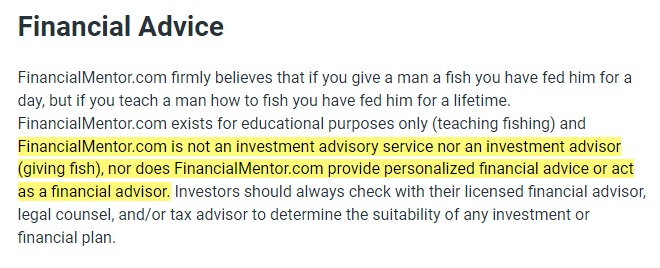
Another danger with inaccuracies is that the Terms and Conditions you copy may not accurately reflect how you actually want to do business.
In most cases, Terms and Conditions agreements set out rules for the relationship between you and a customer on matters such as payment policies, returns and refunds, subscriptions and renewals, cancellations, and how to settle disputes.Copying Terms and Conditions means you give up the opportunity to set these rules.
The business you copy from may have less favorable terms than you would want. This could be for reasons including:
- They are in a weaker position to make demands of customers
- They are a bigger company and can afford to offer such terms to attract customers
- They are less likely to be in situations where the terms become relevant (For example, they may be in an industry where customers are more likely to pay promptly or less likely to return goods)
Not having Terms and Conditions that are suitable for your particular business can be extremely costly. It could seriously affect your cash flow (for example with payments being late, or a high number of returns), which would threaten the viability of even a fundamentally profitable business. It could also leave you vulnerable to legal challenges or liability claims that you can't afford.
It might seem logical to copy terms from an established business such as Smith and Nephew, but doing so in this case could be a bad idea. For example, imagine you copy this clause yet you don't operate with 60 day payment terms and can't afford to:

While Net 60 (payment due 60 days after invoicing) works for this company, a less established business might not be able to attract suppliers on this basis.
How to Write Your Own Terms and Conditions Agreement

Instead of copying another business's Terms and Conditions agreement, it's better to write your own. But this may feel intimidating when you start from scratch.
Here are three ways you can make this task easier.
Use a Terms and Conditions Generator
A Terms and Conditions Generator is the most convenient way to almost instantly create a custom agreement you can easily display on your website or mobile app. Simply move through the steps in the generator interface, answering questions about your business, and your Terms and Conditions agreement will be generated at the end.
Use a Terms and Conditions Template
A Terms and Conditions template is another easy way to create an agreement perfectly tailored to your business without leaving out any important clauses. You can download or access the template in a variety of formats, then manually enter your own information where prompted. When done, you'll have a complete agreement that you can display and share as desired.
Use Another Terms and Conditions Agreement For Inspiration
You can use other Terms and Conditions agreements as an aid to make sure you cover everything necessary in an effective manner, and use it for inspiration for content, formatting and presentation.
If you go this route, make sure to look at an agreement from a business in your industry or that operates similarly to yours so that you get the most relevant information. And remember, don't copy anything word for word.
Content of the Terms and Conditions Agreement
Looking at other Terms and Conditions agreements is a useful way to help with the content of your own document, but you need to do it the right way.
- First, list everything you think you need to cover in your Terms and Conditions
- Then, check the documents of other businesses to see if there's anything you missed
Looking at other businesses first creates too much risk that you miss out something important or mistakenly conclude that because nobody else included it, you don't need to either.
Read through the Terms and Conditions of several other companies so you get a better idea of the range of points to cover. Remember to try to find examples from companies that are in the same industry as you and covered by the same laws.
Keep in mind that looking at other businesses will only help you find the general points you want to cover in your Terms and Conditions. You need to decide the specific details of your agreement, making sure they work for you without deterring too many potential customers.
Use your own phrasing as much as possible, though not to the point of creating ambiguity or changing the meaning.
For example, copying the precise wording that Sears uses here would be a breach of copyright:

However, you might realize this is a point you had overlooked and want to use the same rule. This would be fine if you use your own wording, for example "We have the right to refuse to accept an order, or to cancel an existing order, if it's against the law to use or sell that product or service where you live."
Format of the Terms and Conditions Agreement
Deciding how to format a Terms and Conditions agreement can be tricky and there's really no set answer. Ideally, you want the document to be easily readable (particularly by customers who are looking for an answer to a specific question) without it being way too wordy or long.
Looking at other businesses can help you see which formats work well for your industry. This could include approaches such as:
- Using lists
- Using a single paragraph for each clause covering a different topic
- Using sections on a single topic that contain multiple paragraphs
- Defining terms such as "we" and "you" rather than repeatedly writing out your business name in full or terms such as "the vendor" and "the purchaser"
Looking at the Terms and Conditions of other businesses can also help you decide the best order to list the different topics in your own document. This can include approaches such as:
- Keeping related topics together
- Having the most important topics at the start
- Using a "chronological" approach that mirrors the buying journey from placing an order to payment to delivery to returns and dispute resolution
Juniper Education uses numbered clauses to organize the points it makes:
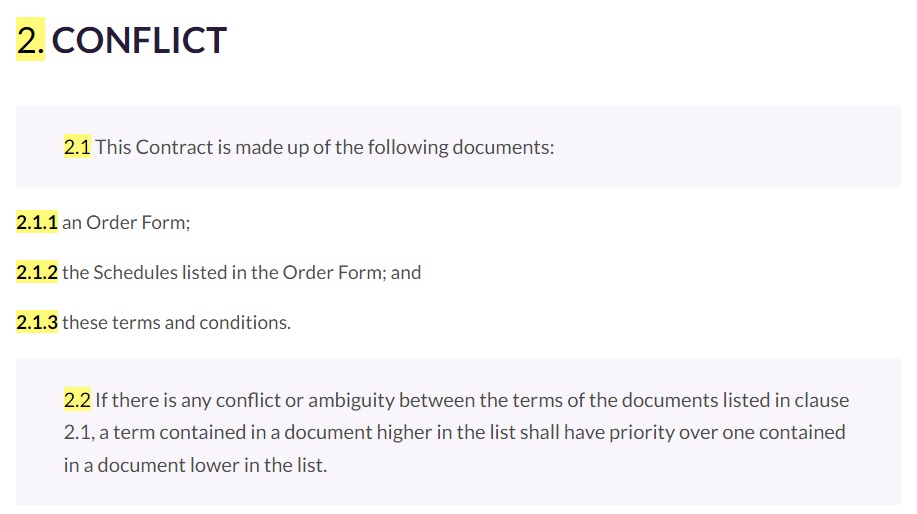
Presentation of the Terms and Conditions Agreement
Looking at the way other businesses display their Terms and Conditions agreements can help you decide on the best places to display yours. This may vary depending on your industry, your relationship with customers, and the size and organization of your website.
Common approaches include:
- Having your Terms and Conditions as a downloadable document in formats such as Microsoft Word or Adobe Acrobat (PDF)
- Having a dedicated web page
- Having the Terms and Conditions as part of a legal page or section that also covers topics such as Terms of Use or a Privacy Policy
- Having the Terms and Conditions appear at the point somebody is about to place an order, for example on the order page itself or in a pop-up window
Royal Mail displays its agreements as standalone linked documents in a list, as it has multiple sets of Terms and Conditions:
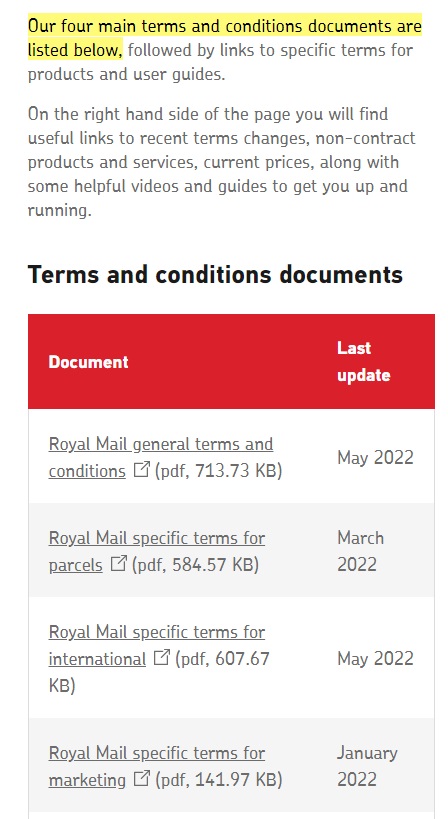
Shell has a brief form of its Terms and Conditions that it adds as a sub-menu on a legal page with other important information:
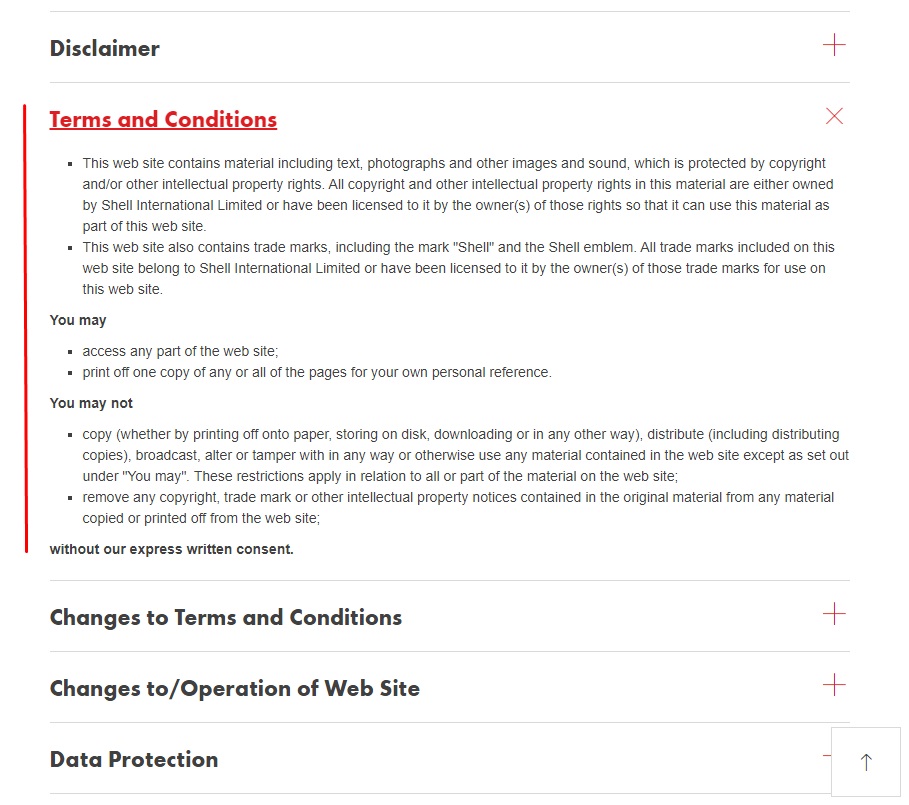
You can also check out whether and how other businesses get users to confirm they have read and agree to the Terms and Conditions. In other words, how consent to be bound by the terms has been obtained.
Methods for obtaining consent often include:
- Not requiring any confirmation and assuming implicit agreement. This is called browsewrap and it is not recommended.)
- Requiring users to check a box or change a toggle setting to confirm agreement before they can place an order. This is called clickwrap and it is recommended.
Here's how Amazon reminds users that placing an order means accepting the terms:
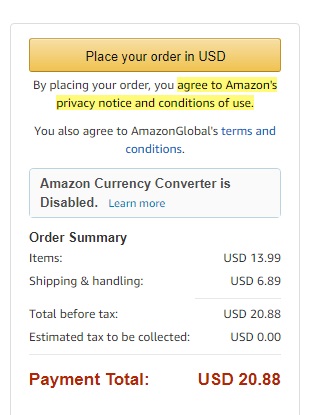
Summary
Let's recap what you need to know about copying Terms and Conditions agreements:
In sum, it's a bad idea to do so. Here's why:
- You will breach copyright law which could mean legal problems and damage to your reputation
- You may include irrelevant terms and clauses, which can cause confusion and make you look unprofessional
- The terms you copy may not be favorable for your business and could cost you money through unfavorable return or refund terms or others
There are great alternatives to copying another business's Terms and Conditions. One alternative is to use a Terms and Conditions Generator. You could also use a Terms and Conditions template.
Alternatively, you could use other Terms and Conditions agreement as reference and inspiration to help you write your own. Plan out the points you want to include, then look at other businesses in your industry to find:
- Important points that you may have missed
- Ways to organize the clauses
- Ways and places to present and display the agreement
- Ways to get customers to consent, or agree to, your terms


